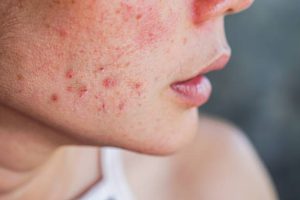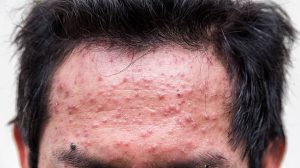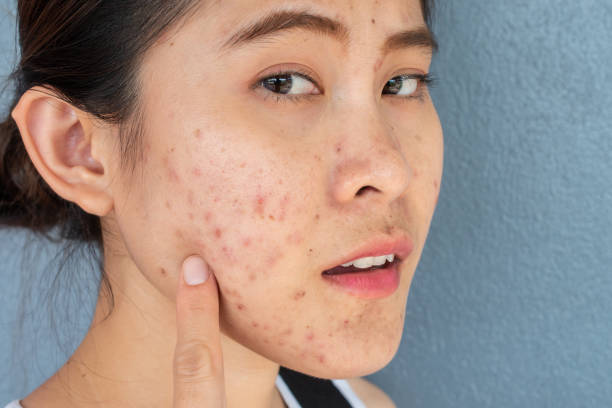Introduction
You know those days when you wake up and can tell, just by looking at your skin, that it’s going to be an acne-y one? And then you try to do everything possible—without any real results—to clear up your complexion? Well, there are some things you can do to prevent these breakouts from happening in the first place. Here are 11 habits that make acne worse:
Popping pimples

Popping pimples can cause scarring and spread bacteria. The damage caused by popping pimples is often enough to worsen your acne, or even lead to scarring. Popping a pimple also introduces more bacteria into the skin, which can leave you with both an inflamed blemish and a bigger problem: infected pustules that will likely require antibiotics if left untreated. And last but not least, popping pimples causes dryness of the skin around them (which leads to flakiness), as well as oiliness in areas where there was once normal-looking skin
Touching your face
- How often should I wash my face?
- How often should I change my pillowcase?
- How often should I clean my makeup brushes and sponges?
Over-washing or over-exfoliating
- The first thing to understand is that over-washing and over-exfoliating can cause more problems than they solve. If a pimple has popped up, you may want to try using a gentler cleanser that won’t aggravate it further, but if you’re washing your face too much generally or scrubbing with harsh products (especially on dry skin), it can make acne worse in the long run.
- To prevent this from happening, Dr. Sejal Shah recommends switching up your routine every time something doesn’t work for you: “If you’ve been using one product for two weeks and haven’t noticed any improvement, then try something else.” She also suggests consulting with a dermatologist before making any changes so they can recommend the best treatment plan for your skin type—and remind you which habits are best left behind forever! best mascara
Being a picky eater

- Acne can be triggered or exacerbated by certain foods, which is why it’s important to figure out what your body reacts badly to.
- You should also pay attention to what you eat in general. Certain foods can cause inflammation and others can help fight acne-causing bacteria.
- Some dietary supplements are essential for people who struggle with acne and other skin conditions, as they provide nutrients that our bodies need but may not be getting enough of.
Using dirty makeup brushes and sponges
The first thing to do is to wash your makeup brushes once a week. You can use baby shampoo, which will not only clean them but also soften them. Alternatively, you could use a brush cleaner that you buy at the drugstore or beauty store.
Before washing your brushes, make sure they’re completely dry and free of product buildup—otherwise, when wetted, they’ll just push around all the dirt from their last use straight into the water instead of cleaning themselves properly.
After rinsing out any excess liquid from your brushes with lukewarm water (no soap!), run them under cold water until they are completely dry again so that mold doesn’t grow in them while they sit on their drying rack overnight!
Not changing your pillowcase often enough

Your pillowcase is a breeding ground for bacteria, which can lead to breakouts. Here’s how to make sure you’re not contributing to the problem:
- Change your pillowcase every other day or more often if you have oily skin. If you find that changing it once a week works better for your skin type, go ahead and do that. Just make sure you’re doing it at least twice a week so as not to irritate your face too much.
- Wash them in cold water on the gentle cycle with mild detergent (like Dreft) and dry them on low heat only—using high heat will shrink their shape and cause wrinkles over time. If possible, air dry them instead of putting them in the dryer so they’ll last longer (and stay wrinkle-free).
Having a diet that’s high in sugar and dairy products
What you eat can significantly impact how your skin looks and feels. Nearly everything you put in your body has an effect on the skin. The following are some of the worst offenders:
- Dairy products
- Sugar and refined carbohydrates (bread, pasta, etc.)
- Processed foods containing preservatives or artificial colors/flavors
If you’re looking to improve the appearance of your acne-prone skin, it’s important that you keep these foods out of your diet as much as possible.
Wearing hats and long hair on your face
One of the most common causes of acne is hair. The problem is that it’s nearly impossible to avoid all types of hair, especially when you have long hair on your face. For example, hats can irritate your skin, causing an outbreak or worsening a pre-existing one.
What’s more, hats can cause itchy and dry skin. They also cause dandruff which leads to further breakouts because it clogs pores and causes build-up on the scalp that leads to inflammation and irritation in the form of acne pimples or blackheads (think about how much worse dandruff gets when there’s too much oil in your scalp). And if you already have an existing condition like eczema or rosacea then wearing certain types of hats will make things even worse due to their material properties (i.e., wool versus cotton) and overall fit which may not be as comfortable as other fabrics/styles would be!
Sleeping with the wrong bedding
If you’re one of those people who go to bed with your face all covered in makeup, stop. When you sleep, your pillowcase (and comforter and sheets) get rubbed against your skin over and over again. Do yourself a favor and use a clean pillowcase every day—and wash the ones you already own often.
If you can’t bear to part with that old pillowcase that has become so thin from overuse that it feels like wearing nothing at all, consider investing in a silk one instead. Silk is known for its ability to wick away moisture from the skin quickly and efficiently while being soft enough not to irritate sensitive areas like underarms or elbows (if you get hot at night). If they’re too expensive for your budget or sound like too much hassle, try looking for cotton-hemmed cases made from breathable materials—like linen—that won’t trap perspiration against your face all night long either; these types of fabrics tend not only feel great but also help regulate temperature well without making things too sweaty under there!
Using oil-based makeup, sunscreens or moisturizers
When it comes to makeup and skin care, oil-based products are bad news. This includes moisturizers, sunscreens and foundations (and pretty much anything else that comes in spray form). Oil-based products clog pores and can cause acne to last longer. It’s also more likely for your blemishes to be redder and more painful if you use an oil-based product on your face. If you’re going for a matte finish on your foundation or powder, try using water-based makeup instead—it will be better for your skin!
You can prevent acne outbreaks by avoiding these habits.
There are a number of things you can do to avoid worsening your acne, but first you need to be aware of the habits that contribute to its development. If you’re already in the habit of doing any of these things, it’s time to make some changes—and if they’re not things you’re currently doing, don’t start!
It can take weeks or even months before you see results and feel better about your skin. In the meantime, don’t get discouraged! Remember that what’s going on inside your body is just as important as what goes into it: if there’s anything else out there that might help improve your complexion (like prescription medication), talk with a dermatologist about whether now is the right time for treatment. But remember: one thing at a time; these 11 habits are all we need for now.
Conclusion
Acne is caused by a combination of genetics and environmental factors, so it’s important to be mindful of the habits that may be contributing to your breakouts. If these seem like familiar scenarios, don’t stress! There are plenty of ways to improve your skin. Try incorporating some of these tips into your routine so that you can start seeing results in no time at all.

